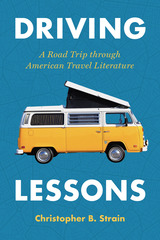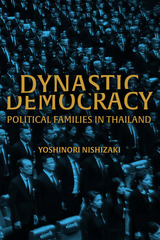
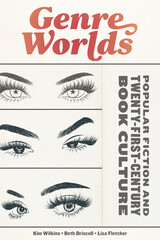
Works of genre fiction are a source of enjoyment, read during cherished leisure time and in incidental moments of relaxation. This original book takes readers inside popular genres of fiction, including crime, fantasy, and romance, to reveal how personal tastes, social connections, and industry knowledge shape genre worlds. Attuned to both the pleasure and the profession of producing genre fiction, the authors investigate contemporary developments in the field—the rise of Amazon, self-publishing platforms, transmedia storytelling, and growing global publishing conglomerates—and show how these interact with older practices, from fan conventions to writers’ groups.
Sitting at the intersection of literary studies, genre studies, fan studies, and studies of the book and publishing cultures, Genre Worlds considers how contemporary genre fiction is produced and circulated on a global scale. Its authors propose an innovative theoretical framework that unfolds genre fiction’s most compelling characteristics: its connected social, industrial, and textual practices. As they demonstrate, genre fiction books are not merely texts; they are also nodes of social and industrial activity involving the production, dissemination, and reception of the texts.
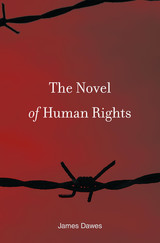
The Novel of Human Rights defines a new, dynamic American literary genre. It incorporates key debates within the contemporary human rights movement in the United States, and in turn influences the ideas and rhetoric of that discourse.
In James Dawes’s framing, the novel of human rights takes as its theme a range of atrocities at home and abroad, scrambling the distinction between human rights within and beyond national borders. Some novels critique America’s conception of human rights by pointing out U.S. exploitation of international crises. Other novels endorse an American ethos of individualism and citizenship as the best hope for global equality. Some narratives depict human rights workers as responding to an urgent ethical necessity, while others see only inefficient institutions dedicated to their own survival. Surveying the work of Chris Abani, Susan Choi, Edwidge Danticat, Dave Eggers, Nathan Englander, Francisco Goldman, Anthony Marra, and John Edgar Wideman, among others, Dawes finds traces of slave narratives, Holocaust literature, war novels, and expatriate novels, along with earlier traditions of justice writing.
The novel of human rights responds to deep forces within America’s politics, society, and culture, Dawes shows. His illuminating study clarifies many ethical dilemmas of today’s local and global politics and helps us think our way, through them, to a better future. Vibrant and modern, the human rights novel reflects our own time and aspires to shape the world we will leave for those who come after.
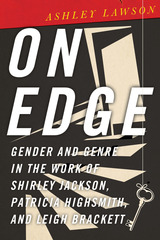
Honorable Mention, 2025 PCA Emily Toth Award For Best Single Work In Women’s Studies Finalist, 2025 Mystery Writers of America's Edgar Awards, Best Critical/Biographical Category Ashley Lawson’s On Edge presents a new picture of postwar American literature, arguing that biases against genre fiction have unfairly disadvantaged the legacies of authors like Shirley Jackson, Patricia Highsmith, and Leigh Brackett. Each of these women navigated a male-dominated postwar publishing world without compromising their values. Their category-defying treatment of gender roles and genre classifications created suspense in their work that spoke to the tensions of the “Age of Anxiety.” Lawson engages with foundational voices in American literature, genre theory, and feminism to argue that, by merging the dominant mode of literary realism with fantastical or heightened elements, Brackett, Jackson, and Highsmith responded to the big questions of their era with startling and unnerving answers. By elevating genre play to a marker of literary skill, Lawson contends, we can secure these writers a more prominent place within the canon of midcentury American literature and open the door for the recovery of their similarly innovative peers.



Everyone’s favorite guide to fiction that’s thrilling, mysterious, suspenseful, thought-provoking, romantic, and just plain fun is back—and better than ever in this completely revamped and revised edition. A must for every readers’ advisory desk, this resource is also a useful tool for collection development librarians and students in LIS programs. Inside, RA experts Wyatt and Saricks
- cover genres such as Psychological Suspense, Horror, Science Fiction, Fantasy, Romance, Mystery, Literary and Historical Fiction, and introduce the concepts of Adrenaline and Relationship Fiction;
- include everything advisors need to get up to speed on a genre, including its appeal characteristics, key authors, sure bets, and trends;
- demonstrate how genres overlap and connect, plus suggestions for guiding readers among genres; and
- tie genre fiction to the whole collection, including nonfiction, audiobooks, graphic novels, film and TV, poetry, and games.
Both insightful and comprehensive, this matchless guidebook will help librarians become familiar with many different fiction genres, especially those they do not regularly read, and aid library staff in connecting readers to books they’re sure to love.


READERS
Browse our collection.
PUBLISHERS
See BiblioVault's publisher services.
STUDENT SERVICES
Files for college accessibility offices.
UChicago Accessibility Resources
home | accessibility | search | about | contact us
BiblioVault ® 2001 - 2025
The University of Chicago Press





